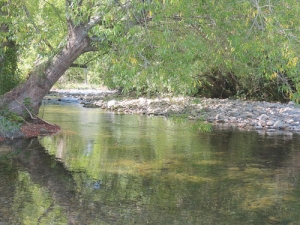Meat Industry Association CEO to Step Down
The Meat Industry Association of New Zealand (MIA) today announced that Chief Executive Officer Sirma Karapeeva has resigned from the role.
 NZ needs to be very careful about not allowing the debate over fresh water quality to be solely about the dairy industry.
NZ needs to be very careful about not allowing the debate over fresh water quality to be solely about the dairy industry.
The country needs to be very careful about not allowing the debate over fresh water quality to be solely about the dairy industry.
That's the view of Environment Minister Dr Nick Smith who, along with Primary Industry Minister Nathan Guy, recently released a consultation document on fresh water entitled 'Next Steps'. This sets out a series of initiatives to improve water quality in lakes, rivers and waterways.
One of the main proposals centres on having dairy cows and pigs excluded from waterways by next July and beef and deer being phased in by 2030. A fine of $100 per animal up to a maximum of $2000 is also proposed.
Smith told Rural News that improving water quality is not just an issue for rural NZ, but for urban NZ as well.
"We need to be honest with city folk and tell them that their water ways are the most polluted. Having said that, we need farmers to appreciate that our biggest water quality problem by scale is in those areas where there is intensive farming," he adds.
"The Government wants to see that everybody does their share of the heavy lifting. There is no question that dairy farmers are under substantial financial pressure and the Government does need to take that into account.
"With that in mind, our view is that the direction around water quality needs to be constant, but the pace needs to be adjusted to take account of the level of financial pressure the dairy industry is under at the moment."
Smith says, in actual fact, the requirement to fence cows out of water ways is not a major one for the dairy industry. He says about 98% of dairy farmers already comply and there are just a few stragglers that need to be dealt with.
The Meat Industry Association of New Zealand (MIA) today announced that Chief Executive Officer Sirma Karapeeva has resigned from the role.
The winners of the 2026 Hawke’s Bay/Wairarapa Dairy Industry Awards were announced at the annual awards dinner held at Copthorne Solway Park in Masterton on Thursday evening.
Environment Southland is welcoming this week’s decision by the Environmental Protection Authority (EPA) to approve the release of Blaptea elguetai, a leaf‑feeding beetle that will help control the highly invasive Chilean flame creeper.
This March, the potato industry is proudly celebrating International Women’s Day on 8 March alongside the International Year of the Woman Farmer, recognising the vital role women play across every part of the sector — from paddocks and packhouses to research, leadership, and innovation.
Fruit trader Seeka posted a record profit and returns to shareholders in 2025.
Recent weather events in the Bay of Plenty, Gisborne/Tairawhiti, and Canterbury have been declared a medium-scale adverse event.